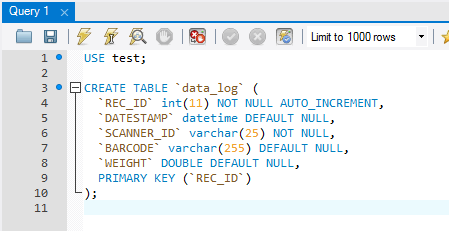

e MARIADB_PASSWORD=entry -e MARIADB_DATABASE=uuidtest \ Here I’ve used podman to run the container and run the mariadb command line in the container: $ podman run -rm -d -e MARIADB_USER=bob \ You can run the container called quay.io/mariadb-foundation/mariadb-dev:10.7-mdev-4958-uuid with the same interface as the Docker Library mariadb image. We’ve prepared three ways you can try this feature out.
#Mysql uuid primary key default how to#
How to try the 10.7 UUID data type preview yourself? $ mariadb -column-type-info -execute "SELECT UUID()" The metadata of the datatype is also a string of type uuid. Similarly, you can expect warnings if you haven’t got the right format: SELECT CAST('longlive-that-bear-a456-426655440000' AS UUID) Like all data types, you can have default values: CREATE TABLE t1 (Ĭ1 UUID DEFAULT 0x00000000000000000000000000000000,Ĭ2 UUID DEFAULT 0xFFFFFFFFFFFFFFFFFFFFFFFFFFFFFFFF,Ĭ3 UUID DEFAULT '00000000-0000-0000-0000-000000000000',Ĭ4 UUID DEFAULT 'ffffffff-ffff-ffff-ffff-ffffffffffff',Ĭ5 UUID DEFAULT CAST(X'FFFFFFFFFFFFFFFFFFFFFFFFFFFFFFFF' AS UUID) This also works with replication the primary/replica can be of these different types and it converts. With these basic conversion rules, you can migrate from your existing CHAR/VARCHAR/TEXT hexadecimal text or BINARY/VARBINARY/BLOB encoded to UUID using: CREATE TABLE t1 (id BINARY(16))

If you have BINARY(16) data strings those can be cast to the UUID too: SELECT CAST(x'102030405000000000000000adcefeff' AS UUID) So for the most part it looks like a string.

What does the UUID data type look like? CREATE TABLE t1 (id UUID) Like the INET6 data type, this uses the datatype plugin API from MariaDB 10.5. A 128-bit value with a text representational value and the prescription of a number of version types to ensure a uniqueness makes it an ideal data type.Īfter many years of the UUID datatype existing only as a feature request in MDEV-4958, slowly accumulating votes and watchers, we are pleased to announce a preview of the UUID data type. This will insert a default unique value to the Id column.Universally unique identifiers (UUIDs) have a common place in computing already. When inserting the records, we simply have to specify “default” as value for the first column. This will ensure that whenever a new record is inserted in the EngStudents1 table, by default, the NEWID() function generates a unique value for the Id column. To set a default value for the column we will use the default keyword and set the default value as the value returned by the ‘NEWID()’ function. Let’s create a table EngStudents1 within the EngDB but this time we change the data type of the Id column from INT to UNIQUEIDENTIFIER. Now, let’s see how GUID can be used to solve this issue This causes the violation of primary key constraint for the Students table. You can see that students Shane and Sally both have Ids of 1 while Jonny and Edward both have Ids of 2. This is when we need to use the GUID data type. However, what if we want records to have unique values across multiple databases? For instance, we want that the Id column of the EnglishStudents table and the MathStudents table to have unique values, even if they belong to different databases.


 0 kommentar(er)
0 kommentar(er)
